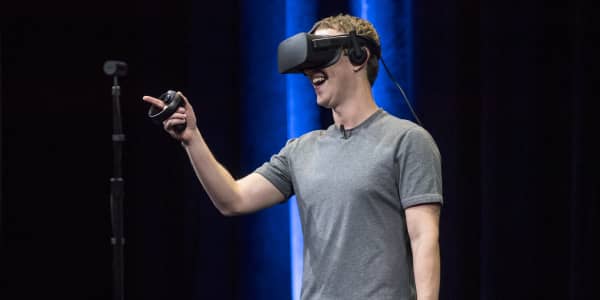A senior Amazon executive working on technology that recognizes faces and images in videos has left the company to join a start-up that's using the software to help advertisers grab attention.
Humphrey Chen, who spent almost two years at Amazon Web Services focusing on the company's Rekognition image and video analysis tools, told CNBC that he recently became chief product officer at VidMob.
Rekognition can be used for many purposes, but has drawn controversy after police departments began piloting it to identify potential suspects. Amazon also made an effort to sell it to the U.S. Immigration and Customs Enforcement agency, according to documents uncovered by the nonprofit Project on Government Oversight, and the FBI has explored using it. Employees and shareholders have both protested, asking Amazon to stop selling it to law enforcement agencies, but Amazon easily defeated a shareholder proposition that would have forced its hand. Chen said that controversy didn't factor into his decision to depart.
VidMob, which has about 110 employees, incorporates Amazon's technology for a very different purpose: So customers can build more engaging video ads on social media sites like Facebook, Snapchat and Pinterest. The Rekognition software helps VidMob analyze ads and determine when and why viewers are clicking or scrolling away — a piece of music, awkward text, or an unattractive facial expression — enabling marketers to make the necessary tweaks and experiment in different ways.
"Ideally, every advertiser would want you to see the full ad from the beginning to end, but the reality is that people are actually scrolling away because they're not interested," Chen said. "Advertisers want to know why more people are scrolling away in one version of an ad or another version of the ad."
Alex Collmer, VidMob's CEO, said he met Chen when VidMob began using the Rekognition technology about two years ago. Initially, Collmer estimates that VidMob tried running tens of thousands of files through Rekognition. With such large workloads, Chen contacted him to learn more about what VidMob was doing.
Collmer told CNBC that the company was talking to a number of people about the position and, out of nowhere, he received a text from Chen, who had heard about the opportunity.
VidMob counts on Rekognition technology to learn what resonates with people while they're watching ads on LinkedIn, Facebook or other platforms. For example, a company struggling with its reputation might figure out that it's showing its logo too early in an ad, turning off consumers, after testing other arrangements where the logo doesn't pop up until later.
"Fine-tuning the ad based on the individual elements of the ad can actually change its performance and its reach," Chen said.
Chen's hiring comes less than three months after VidMob raised $25 million in a financing round to help the company build out a suite of products that it calls the Agile Creative Studio. VidMob is now working to make its technology more self-service.
WATCH: App stores are vulnerable in DOJ's antitrust probe, says analyst






